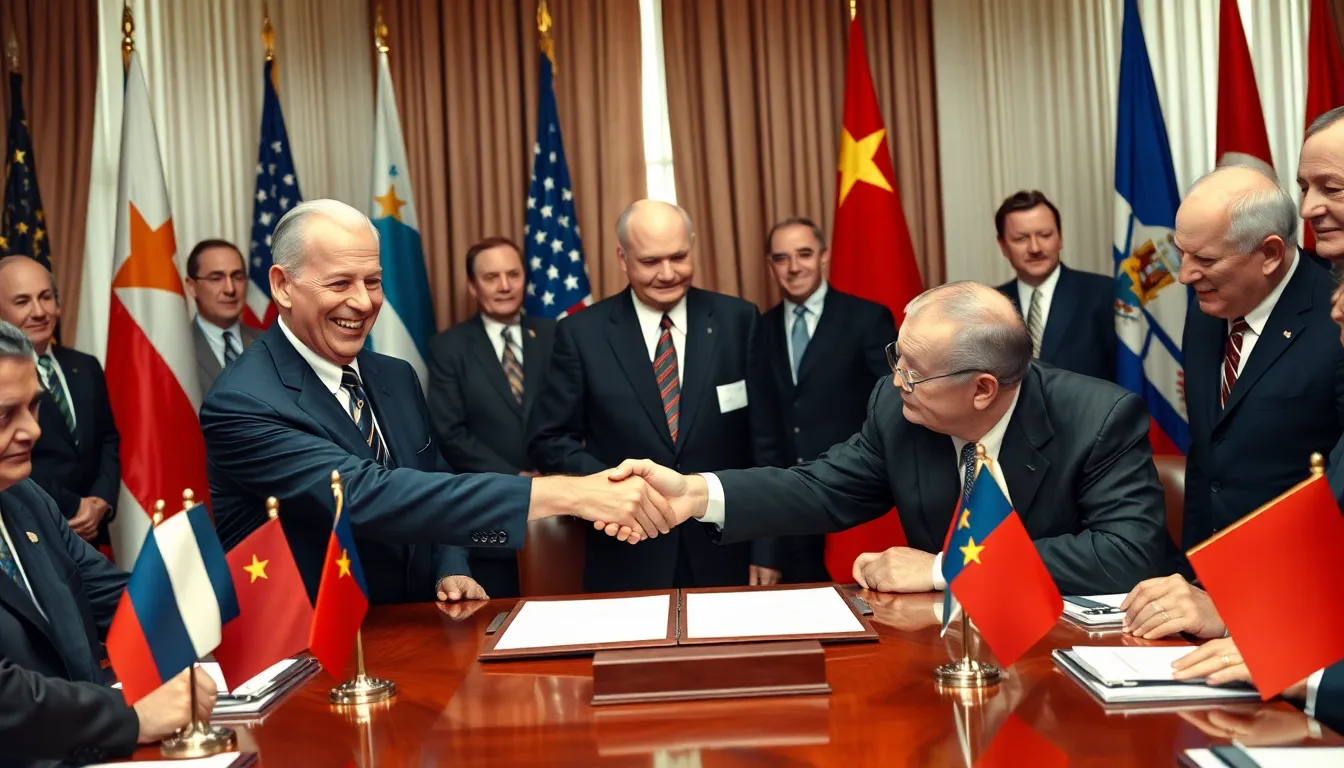As humanity pushes the boundaries of exploration beyond Earth, space policy emerges as a critical framework guiding these endeavors. With advancements in technology and a growing interest in space travel, nations and private entities alike are grappling with the complexities of governance in the cosmos. From satellite regulation to international treaties, space policy shapes how we navigate this vast frontier.
Understanding space policy isn’t just for policymakers or scientists; it’s essential for anyone intrigued by the future of exploration and the implications for global cooperation. As new players enter the arena, the need for clear and effective policies becomes even more pressing. This article delves into the key components of space policy, its evolution, and its impact on both terrestrial and extraterrestrial activities.
Table of Contents
ToggleOverview of Space Policy
Space policy encompasses a range of regulations and guidelines that govern activities in outer space. It addresses issues such as international cooperation, space exploration, satellite deployment, and space debris management. With technological advancements and increased interest, nations and private companies constantly refine their policies.
Key Components of Space Policy
- International Treaties: Treaties like the Outer Space Treaty of 1967 establish foundational principles for space exploration and use. These legal frameworks guide state behavior in space.
- Regulatory Agencies: Agencies like NASA, ESA, and their counterparts worldwide formulate and enforce space policies. They ensure compliance with international agreements and safety standards.
- Commercial Activities: Policies have evolved to accommodate commercial enterprises in space, including satellite launches and space tourism. Regulation of these activities ensures safety and fair competition.
- Sustainability Initiatives: Sustainable practices in space exploration focus on minimizing debris and protecting natural resources. Policies encourage responsible designs and technologies to preserve the space environment.
Evolution of Space Policy
Space policy has transformed significantly since the space race era. Initially, emphasis was on military and scientific objectives. Today, the focus includes commercial interests, sustainability, and bilateral agreements that promote peaceful use of space. Partnerships between public entities and private companies have reshaped the landscape, making policies more dynamic and inclusive.
Impacts of Space Policy
Space policy affects both national and global efforts in research, security, and cooperation. Well-defined policies foster collaboration on international projects like the International Space Station (ISS). They also influence economic growth through space-related industries, creating jobs and advancing technology. Clarity in regulation promotes innovation while balancing safety and exploration aims.
Historical Context of Space Policy

Understanding the historical context of space policy illuminates the development and evolution of governance in outer space. Key agreements and geopolitical events have shaped the framework for current and future exploration.
Early Space Exploration Agreements
Early agreements laid the foundation for international collaboration in space. The 1967 Outer Space Treaty established essential principles, including the prohibition of claims of sovereignty and the use of space for peaceful purposes. This treaty was signed by over 100 nations and remains central to international space law. Other agreements, such as the 1972 Convention on International Liability for Damage Caused by Space Objects and the 1975 Registration Convention, built upon this framework, addressing liability and object registration in space. These early agreements encouraged responsible exploration and cooperation among nations.
The Cold War and Its Impact
The Cold War significantly influenced space policy development. The space race, driven by competition between the United States and the Soviet Union, pushed technological advancements and military investments. The 1957 launch of Sputnik marked the beginning of this era, spurring the U.S. to establish NASA in 1958. Tactical objectives, such as demonstrating technological superiority, took precedence during this time. Nevertheless, the intense rivalry eventually led to collaborative efforts, exemplified by the 1972 Apollo-Soyuz Test Project, which marked the first international human spaceflight mission. This cooperation during the Cold War highlighted the potential for diplomacy in space, setting a precedent for future international partnerships.
Current Space Policy Framework
The current space policy framework encompasses national and international efforts to govern activities beyond Earth. This includes guidelines that shape exploration, commercialization, and cooperation in space.
National Space Policies
National space policies vary across countries, reflecting unique strategic interests and goals. The U.S. National Space Policy emphasizes commercial partnerships, workforce development, and international collaboration.
- The U.S. seeks to bolster innovation through private sector investment.
- Countries like Russia focus on enhancing military capabilities alongside civil space programs.
- The European Union prioritizes environmental sustainability and the sustainable use of space resources through its Space Strategy.
National agencies, such as NASA in the U.S. and ESA in Europe, play significant roles in executing these policies. Regulatory frameworks often address satellite launches, space debris management, and spectrum allocation, ensuring responsible use of outer space.
International Treaties and Agreements
International treaties and agreements form the backbone of global space governance. Key documents establish parameters for peaceful exploration and cooperation among nations.
- The Outer Space Treaty of 1967 set fundamental principles, asserting that space exploration should benefit all humankind.
- The 1972 Convention on International Liability for Damage Caused by Space Objects defines liability for damages caused by space activities, promoting accountability.
- The Registration Convention requires states to register space objects, enhancing transparency in space operations.
These treaties encourage collaboration, as seen in initiatives like the International Space Station, where multiple nations contribute to scientific research and exploration. The evolution of these agreements reflects the growing complexity of space activities, requiring ongoing dialogue among spacefaring nations.
Key Issues in Space Policy
Space policy encompasses various critical issues shaping how humanity engages with outer space. These issues include space debris management, space resource utilization, and geopolitical implications, all of which require careful consideration by policymakers and stakeholders.
Space Debris Management
Space debris poses a significant risk to operational satellites and human activities in orbit. The rise in satellite launches, particularly from commercial entities, contributes to the accumulation of debris. Effective management strategies include tracking debris, establishing guidelines for deorbiting defunct satellites, and developing technologies for debris removal. The European Space Agency’s (ESA) Space Debris Office monitors objects in Low Earth Orbit (LEO), providing data essential for collision avoidance. Collaborative international efforts, like the Inter-Agency Space Debris Coordination Committee, aim to create standardized practices that enhance safety and sustainability in space.
Space Resource Utilization
The extraction and utilization of extraterrestrial resources present new opportunities and challenges. Resources like water, minerals, and Helium-3 found on asteroids or lunar bodies hold potential for supporting space missions and fueling economic growth. The 1979 Moon Agreement, though not widely adopted, emphasizes the need for equitable resource exploitation. The advancement of technologies for in-situ resource utilization (ISRU) can enable longer space missions and reduce reliance on Earth resources. Companies like Planetary Resources and Deep Space Industries are pioneering efforts in this field, highlighting the importance of clear regulatory frameworks to govern resource ownership and exploitation rights.
Geopolitical Implications
Geopolitical considerations significantly influence space policy as nations vie for leadership in space exploration and utilization. Tensions may arise due to competing interests in technology development, military capabilities, and territorial claims in space. The establishment of partnerships, like the Artemis Accords, promotes cooperative endeavors while setting guidelines for responsible behavior in space activities. Furthermore, emerging spacefarers, such as China and India, shift the balance of power, compelling existing space-faring nations to adapt their strategies. Ensuring diplomatic engagement and conflict resolution mechanisms becomes essential to maintain peace and collaboration in an increasingly crowded space environment.
Future Trends in Space Policy
Future trends in space policy reflect ongoing developments in technology, commercial interests, and global cooperation. As space activities expand, stakeholders must adapt regulatory frameworks to address new challenges and opportunities.
The Role of Private Sector
The private sector increasingly influences space policy through innovation and investment. Companies like SpaceX and Blue Origin lead advancements in launch technologies, reducing costs and increasing access to space. Public-private partnerships enhance governmental capabilities while stimulating economic growth. Collaboration between startups and established agencies fosters a vibrant ecosystem that supports satellite deployment, space tourism, and lunar exploration. Regulatory bodies must accommodate this dynamic environment, ensuring safety and compliance while encouraging entrepreneurial endeavors.
Emerging Technologies and Policies
Emerging technologies significantly shape space policies, particularly in areas like satellite systems, artificial intelligence, and space resource extraction. Miniaturization of satellites has led to the rise of megaconstellations, requiring regulations to prevent overcrowding and mitigate space debris. Artificial intelligence enhances data analysis for monitoring activities in space, influencing both national security and commercial endeavors. Policies addressing planetary protection become crucial as countries pursue extraterrestrial mining, necessitating frameworks to manage resource extraction responsibly. These technologies not only facilitate exploration but also elevate the importance of ethical considerations in developing sustainable practices for future generations.
The landscape of space policy is rapidly evolving as humanity pushes the boundaries of exploration and innovation. With the increasing involvement of private entities and the growing complexity of international collaboration, it’s clear that effective governance is essential for sustainable practices in space. The interplay between national interests and global cooperation will shape the future of space endeavors.
As nations and organizations navigate challenges like space debris and resource utilization, the need for clear regulatory frameworks becomes more pressing. The ongoing dialogue around space policy not only influences technological advancements but also fosters a collaborative spirit that can lead to remarkable achievements. Embracing this dynamic environment will ensure that space remains a realm of opportunity for generations to come.




